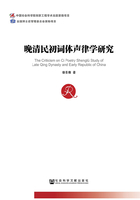
Abstract
The thesis takes research findings on Shenglü from experts of Ci Poetry in late Qing Dynasty as object of study, exploring the background and theory, combing the evolution process and main characteristics, summarizing its achievements and evaluating the success and failure.
It is not by accident that Ci Poetry Shenglü Study became prosperous in late Qing Dynasty. During this period, the style of Ci Poetry of Jiang Kui and Zhang Yan prevailed and the Ci Poetry circle reached an unprecedented prosperity. In the field of Ci Poetry research, the concept, attaching importance to style of Ci Poetry requires musicality accord style of Ci Poetry, were proved. Besides research field, prosperous of classics, phonology, dramatic promoted the development of the Shenglü. The study of Ci Poetry was germinated in Tang and Song Dynasty. And the study of Ci Poetry poems was rised in Ming Dynasty. In the early and middle period of Qing Dynasty, the study system of Ci Poetry Shenglü began to emerge. In late Qing Dynasty, the environment and theory foundation for the rapid development of Ci Poetry Shenglü was provided.
The research on Ci Poetry Shenglü in late Qing Dynasty includes two phases. The first phase began with the first year of reign of Emperor Daoguang till the end of 19 th centuries. During this period, Shenglü theory was fashionable in Ci Poetry circle. For Ci Poetry researcher, finding the combination of lyrics and music inside the style of Ci Poetry was the most important purpose. They tried to explore the matching rules between poem and musicality from the respects of four-tones, rhymes and five-tunes, in order to achieve rhythm. At the same time, revision and supplement for Ci Lv and study on music of Ci Poetry were in full swing. With the in-depth study, the Ci Poetry Shenglü became more and more complicated and unrealistic. Among Ci Poetry researchers of this period, Peng Fenggao and Xie Yuanhuai represent the two trends. Peng Fenggao thinks that the ancient music is linked modern music. He also believes that words and music is integrated. Thus tonality should be dominant for Ci Poetry Shenglü. While Xie Yuanhai found the different tonality between poems and musicians by coordinating with musician.
At the second phase, began with the late 19 th centuries till 1920 s, the Ci Poetry Shenglü was established on the base of reflection on success and failure of earlier research. The research object changed from tonality which became more and more difficult to distinguish and practice to rhyme scheme, striving to explore the musicality from style of Ci Poetry itself. Accordingly, the study of music of Ci Poetry also gradually faded out. Many Ci Poetry researchers proposed to replace the instruments by chant to chant the elegance of music, in order to approve the Shenglü theory. As the reflection of ignoring lyrics by phasing tonality during earlier period, compensation of ignoring tonality in the current period as well, the poems of the four master of late Qing Dynasty with strict rhyme scheme and elegance words were regarded as models in Ci Poetry circle in late Qing Dynasty. Ci Bi by Chen Rui and Ci Tong by Xu Shaoqi represented such trend and became the pioneer. Ci Bi summarized the sentence style of Ci Poetry comprehensively and systematically, being called the draft of study of Shenglü and tone raised by Long Yusheng. Xu Shaoqi represented the concept of natural rhythm from Ci Tong, on the base of Ci Lv Jian Que .
Keywords: Style of Ci Poetry; Shenglü; Ci Poetry Study in Late Qing Dynasty and Early Republic China